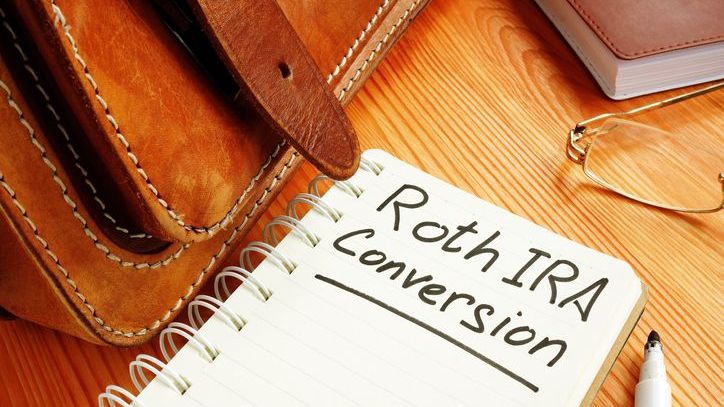Fortunately, there’s no age restriction on converting a pre-tax retirement account to a Roth IRA. You can roll funds from a qualifying pre-tax account to a Roth IRA at any time.
The more important, and difficult, question to answer is whether it’s wise to convert your savings to a Roth IRA later in life. A lifetime of tax-free withdrawals is a significant benefit to a Roth conversion, but doing so in your 60s means you have fewer years of tax-free growth going forward.
Let’s say you and your spouse are both 62 years old with $950,000 in traditional IRAs. Here’s how you could potentially approach a Roth conversion and specific rules you should keep in mind as you do it.
Are You Too Old For a Roth Conversion?
There is no age limit or income/asset level required for executing a Roth conversion. You can convert any amount of money from a traditional IRA at almost any time. Neither your age (62) nor your IRA balances ($950,000) would restrict your eligibility for a Roth conversion.
It is not too late to make this conversion.
The only age-related restriction relates to required minimum distributions (RMDs). Everyone age 73 and older must take a minimum amount out of a pre-tax account, like a 401(k) or an IRA, every year. You cannot fund a Roth IRA with RMD money, so if you convert funds in a year when required minimum distributions apply you must first take that distribution and then you can convert any remaining funds.
At age 62, you are also eligible to begin taking Social Security, although your benefits will be reduced. These, too, will not affect your eligibility for a Roth conversion. Just keep in mind that you can’t contribute Social Security income to a Roth portfolio because those benefits are not considered earned income. However, no amount of benefits will restrict your ability to convert existing IRA funds into a Roth account. A financial advisor can help you evaluate whether a Roth conversion is a good move for you.
Is It Wise To Take a Roth Conversion?

The more important question is whether it’s wise to convert your traditional IRA into a Roth IRA at this point. The answer is complicated.
When you make a Roth conversion, you pay income taxes on all the money that’s getting converted. If you convert $950,000 from an IRA into a Roth IRA, the money would count as income this year, pushing you into the 37% tax bracket. You would pay nearly $267,000 in income taxes, leaving you with around $683,000 in your Roth IRA after taxes.
You still have five years of portfolio growth left before you reach full retirement age (FRA), at which point you’ll be eligible for your full Social Security benefits. Assuming a rather conservative 5% annual rate of return during those years, your Roth IRA would hypothetically grow to $871,700.
While that’s less than you would have started with before the conversion, you won’t be taxed on this money going forward.
Keep in mind that the longer a Roth IRA stays fully invested, the better. That’s because these accounts aren’t subject to the same tax drag that a traditional IRA or 401(k) faces. So money that would have been lost to taxes remains invested, compounding your returns. They’re also most suitable for people who expect to pay higher tax rates in retirement than they do today.
A financial advisor can help you calculate your tax liability on a Roth conversion or evaluate your options for managing your IRA.
Five-Year Rule and Staggered Conversions

If you do want to make a conversion, the IRS requires most savers to keep the converted balance in their Roth IRA for a minimum of five years or face a 10% early withdrawal penalty. However, this specific five-year rule doesn’t apply to people who are 59 ½ or older.
If you have not yet reached that age but have $950,000 to convert, you could use staggered conversions. This is when you convert your IRA to a Roth account a little bit at a time. Instead of moving all $950,000 in one year, you might move $190,000 per year for five years.
This will lower your tax bill for any given year (compared to a lump sum conversion) and will help keep money available despite the five-year rule. On the other hand, it will water down your untaxed gains, by keeping in your tax-deferred IRA for longer.
Bottom Line
There is no age limit on when you can convert pre-tax retirement savings into a Roth IRA. However, converting a large sum – $950,000, for example – would trigger a massive tax bill and eat into the benefits associated with Roth IRAs. Luckily, the five-year rule for Roth conversions doesn’t apply to people who have reached age 59 ½.
Tips for Managing Your IRA
- Whether you rely on it entirely or use it to supplement a workplace retirement savings account, an IRA account can help you build a secure retirement. But managing your own IRA can be daunting. Here are a few services you may want to consider when opening an IRA so that you can get started with confidence.
- A financial advisor can help you manage your IRAs and work with you to build a comprehensive retirement plan. Finding a financial advisor doesn’t have to be hard. SmartAsset’s free tool matches you with up to three vetted financial advisors who serve your area, and you can have a free introductory call with your advisor matches to decide which one you feel is right for you. If you’re ready to find an advisor who can help you achieve your financial goals, get started now.
Photo credit: ©iStock.com/designer491, ©iStock.com/pixdeluxe, ©iStock.com/simonkr
Read the full article here
















